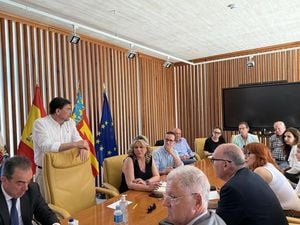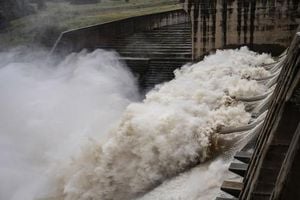Conservative candidate Philip Lawrence has been re-elected as the Member of Parliament for Northumberland-Clarke following a closely contested election on April 28, 2025. Lawrence secured approximately 49.7 percent of the vote, narrowly defeating Liberal candidate John Goheen, who garnered about 45 percent. This election marks Lawrence's continuation in office since he was first elected in 2019.
As the results rolled in, the riding's race was tight, with only about 150 votes separating the two candidates at one point during the evening. Lawrence, who resides on a small farm in Orono with his wife and two children, expressed gratitude to voters for their support and emphasized his eagerness to continue advocating for local residents.
With 252 out of 254 polls reporting, Lawrence had received 32,692 of the 65,762 votes cast, translating to 49.71 percent of the total. Goheen, the Liberal contender, was close behind with 29,588 votes, or 44.99 percent, while Ava Becker of the New Democratic Party trailed with 1,976 votes, representing just 3 percent of the total.
The election results are significant not only for Lawrence but also for the broader political landscape in Canada. The Liberals are projected to form a minority government, which has implications for how policies will be shaped moving forward. With the Liberals having 162 races called in their favor and leading in six other ridings, they collectively received 8,363,205 votes, which accounts for 43.55 percent of the popular vote. In contrast, the Conservatives, including Lawrence, secured 144 races with 7,945,574 votes, or 41.37 percent of the popular vote.
The election also saw the Bloc Québécois winning 22 races and leading in one other riding, totaling 1,223,352 votes and 6.37 percent of the popular vote. The New Democratic Party managed to win five races, leading in two more, with a total of 1,204,546 votes, or 6.27 percent. The Green Party, while smaller in scale, secured one race and received 238,868 votes, representing 1.24 percent of the popular vote.
As Parliament dissolved prior to the election, the previous seat distribution included the Liberals holding 152 seats, the Conservatives with 120, the Bloc Québécois at 33, the New Democrats at 24, and the Greens with two seats. Additionally, there were three independents and four vacancies within the 338-seat House of Commons.
Lawrence, who serves as the shadow minister for the Federal Economic Development Agency for Ontario, has expressed his commitment to addressing the issues that matter most to his constituents. After the election results were announced, he stated, "I am grateful for the trust placed in me by the people of Northumberland-Clarke. I look forward to continuing our work together to improve our community and ensure that our voices are heard in Ottawa."
The riding of Northumberland-Clarke, previously known as Northumberland—Peterborough South, underwent boundary updates for the 2025 federal election. This change reflects the growing population and the need for better representation in Parliament.
With 31,357 voters participating in advance polls, the level of engagement in this election indicates a robust interest in local and national issues. The close race between Lawrence and Goheen highlights the competitive nature of Canadian politics, where every vote counts.
As the official results are expected to be confirmed in the coming days, the implications of this election will be closely watched, not just in Northumberland-Clarke but across Canada. Political analysts suggest that the outcome may influence how both the Conservative and Liberal parties strategize for future elections, especially given the shifting dynamics within Parliament.
In the aftermath of the election, discussions around key issues such as economic development, healthcare, and environmental policies are likely to intensify. Lawrence's role as a shadow minister will be pivotal as he aims to advocate for the interests of his constituents while navigating the complexities of a minority government.
The 2025 Canadian federal election serves as a reminder of the importance of civic engagement and the impact of local representatives on national policy. As the dust settles from this election, the focus will shift to how elected officials will fulfill their promises and address the pressing concerns of their constituents.




